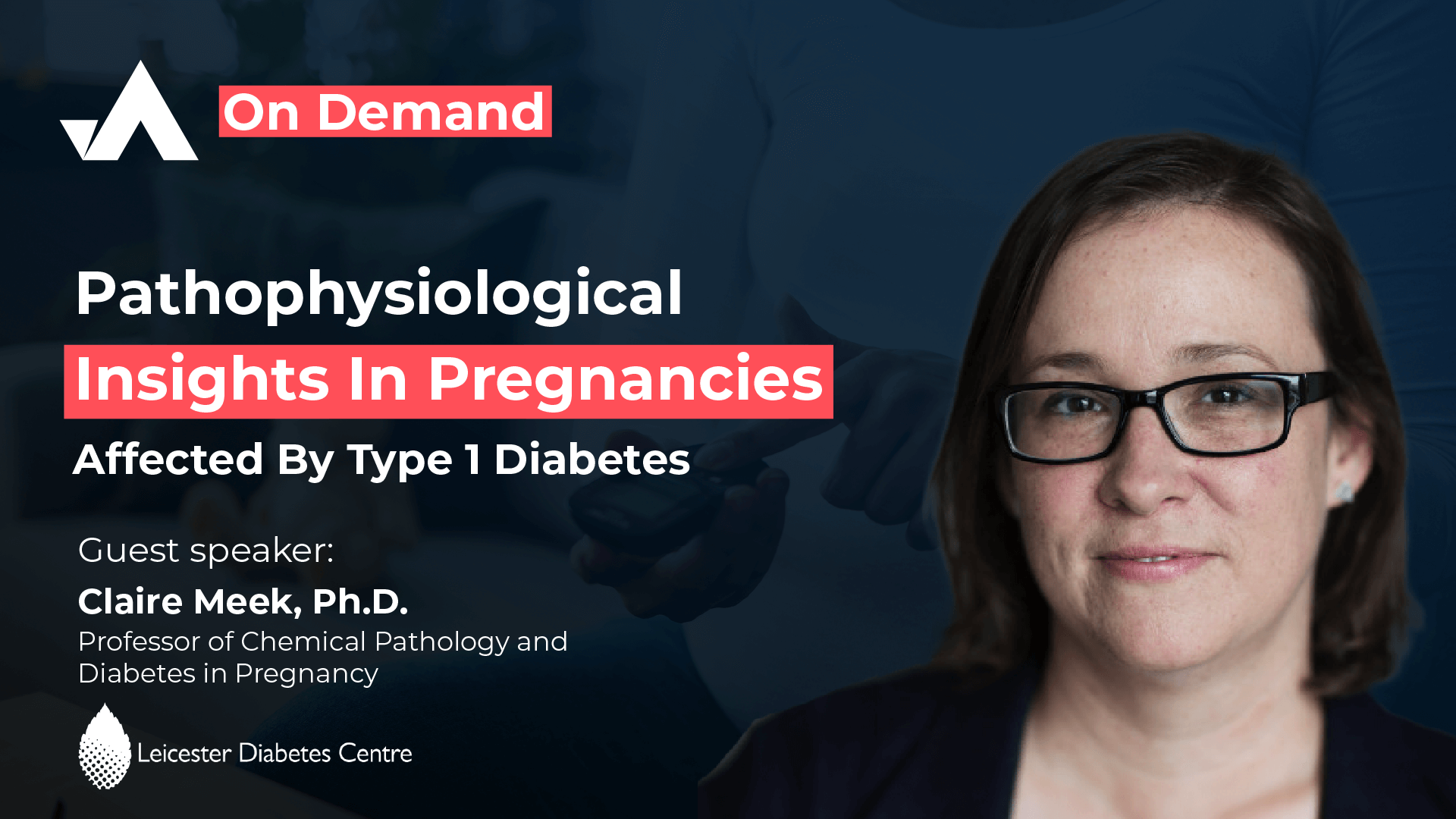ON DEMAND WEBINAR
Metabolomics: Novel Pathophysiological Insights in Pregnancies Affected by Type 1 Diabetes

Type 1 diabetes in pregnancy presents a unique set of challenges to ensure the well-being of both the mother and baby. Careful monitoring is required to maintain stable glucose levels to reduce the risk of complications. However, the mechanisms underlying the impact of glucose levels on the physiology of human pregnancy is not fully understood. Gaining insights into how pregnancy is affected by type 1 diabetes is vital for advancing care plans, reducing risk, and improving pregnancy outcomes.
Metabolomics, the study of small molecules, can help unveil intricate metabolic changes and decipher biomarkers associated with type 1 diabetes and pregnancy. This approach can facilitate a better understanding of this condition which can drive better care.
In this webinar, Claire Meek, Ph.D., a Professor of Chemical Pathology and Diabetes in Pregnancy at Leicester Diabetes Centre, discusses her work with the Continuous Glucose Monitoring in Women with Type 1 Diabetes in Pregnancy Trial (CONCEPTT). Dr. Meek outlines her methodology and approach to data analysis that enabled her to identify novel pathophysiological insights that can help to improve the care of pregnant individuals with type 1 diabetes.
In this webinar you will learn:
-
- Implications and risks of type 1 diabetes during pregnancy
- How to utilize a metabolomics approach to understand underlying physiology
- Benefits of untargeted metabolomics approaches
- Strategies for metabolomics data analysis to provide actionable biological insights
Programme
Type 1 diabetes in pregnancy is associated with suboptimal pregnancy outcomes, attributed to maternal hyperglycemia and offspring hyperinsulinism. However, in-depth study of the physiology and pathophysiology of human pregnancy remains very challenging. We assessed metabolomic patterns associated with risk factors (maternal hyperglycemia, diet, BMI, weight gain) and perinatal complications (pre-eclampsia, large for gestational age, neonatal hypoglycemia, hyperinsulinism) in the Continuous Glucose Monitoring in Women with Type 1 Diabetes in Pregnancy Trial (CONCEPTT). Our findings highlighted novel pathophysiological processes with immediate implications for antenatal care.
This section of the webinar includes:
- A brief introduction to the main complications of type 1 diabetes in pregnancy
- A brief description of methodology
- A description of data analysis and approach to interpretation
Achieving fast, accurate, and reproducible metabolomic data can be a challenging task that requires investing in people, technology, and novel methods to derive functional insights. In this short session, we demonstrate how Metabolon’s metabolomics-as-a-service solution can be leveraged to improve metabolite-level insights today.
- Results of the metabolomics analysis
- A brief description of methodology
- Key translational implications for clinical care
Speakers
Claire Meek, Ph.D.
 Professor of Chemical Pathology and Diabetes in Pregnancy at Leicester Diabetes Centre
Professor of Chemical Pathology and Diabetes in Pregnancy at Leicester Diabetes Centre
LinkedIn: https://www.linkedin.com/in/claire-meek-39b97a3b/
X (Twitter): https://twitter.com/ClaireMeek5
Website: https://www.mrl.ims.cam.ac.uk/research/principal-investigators/claire-meek/
Claire Meek is Professor of Chemical Pathology and Diabetes in Pregnancy at Leicester Diabetes Centre. She runs the diabetes in pregnancy service at University Hospitals Leicester, which includes a large, ethnically and socioeconomically diverse cohort of women with early-onset type 2 diabetes (EoT2D). She runs observational and interventional studies to improve clinical outcomes for women with diabetes in pregnancy.
Prof. Meek started her research career at the University of Cambridge, studying nutritional interventions to improve glycemia and weight loss in people with type 2 diabetes. Postdoctorally, she contributed to the CONCEPTT trial, assessing real time continuous glucose monitoring in type 1 diabetes in pregnancy, translated into clinical care internationally. In 2018, she received a Diabetes UK intermediate clinical fellowship to run a RCT of a dietary intervention in gestational diabetes (DiGest trial; recently finished). She also received a Future Leaders’ Award from the European Foundation for the Study of Diabetes (2019) in association with the Novo Nordisk Foundation, assessing progression to EoT2D after gestational diabetes.
Prof. Meek has received several other national and international awards including from the American Diabetes Association, the European Diabetes in Pregnancy Study Group, the Association of Physicians (UK), and the British Medical Foundation.
Alessandro Busetti, Ph.D.
 Field Metabolomics Scientist at Metabolon
Field Metabolomics Scientist at Metabolon
Dr. Busetti is one of Metabolon’s most experienced Field Metabolomics Scientists and supports client projects across Europe and Asia. Alessandro obtained his bachelor's degree in biology and his master’s degree in molecular biology at the University of Rome, La Sapienza. He obtained his Ph.D. in pharmaceutical microbiology at The Queen’s University, Belfast (QUB).
Dr. Busetti spent 10 years conducting research in academia, both as a Research Fellow at QUB and as a Research Associate at the University of Glasgow. His research focused on the discovery of marine-derived bioactives for biomedical applications and understanding the role of microbiomes in regulating host health.
In 2016, he transitioned into the industry and joined 4D Pharma PLC, where he worked as the Senior Team Leader of the “Discovery-Micro” Department. There, he defined and implemented screening strategies to identify candidate LBP strains for a number of disease areas ranging from autoimmune diseases, solid tumors, neurodegenerative diseases, and more.
Dr. Busetti is a true scientific chameleon with a broad knowledge of many research areas of focus, but his main passion remains host-microbe interactions, microbiome studies, and “socio-microbiology.” He is based in Verona, Italy, where he lives with his wife and daughter.

